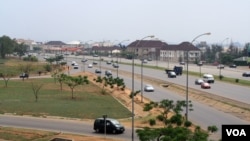ABUJA, NIGERIA —
The Nigerian capital, Abuja, is rapidly expanding with construction sites around every corner. Most Nigerians in and around the capital, though, can not afford to live in any of these new buildings. Instead, they live in makeshift towns that are regularly demolished as the city expands. One town has headed to court to try to keep its homes.
Driving through central Abuja, it’s hard to believe that most Nigerians live in abject poverty. The roads are smooth and the buildings are shiny. A giant mosque and a giant church make the skyline look like gold.
But most Nigerians in this town live away from the city center. People live in places like this settlement, called Mpape. Most of the roads are not paved and there are hardly any city services.
Displacement fears
Sylverline Egeonu sells nuts and traditional chalk on a quiet road in Mpape. She said she moved here and built her house after she was thrown out of her last home by city developers in 2006.
“Before, government come there and demolished that place," she said. "After that time they tell us if we are coming to Mpape we are coming at our own risk. That’s why we come to Mpape. They say that: Mpape, we will not demolish.”
Now, she said, her new home is slated to be demolished.
John Odewale, who heads the Mpape resident’s association, said security forces came to town last summer and marked almost every building with a red ‘X,’ indicating that it was coming down.
“T’was 4 p.m. We saw fully armed policemen, militiamen and others like that and a lot of vehicles working down towards the valley there. They came down. They started marking house like that. So people [were] panicking,” said Odewale.
But Mpape was never torn down, he said, because local activists took their case to court. The demolition was supposed to start last August but the judges ordered it delayed until they hear the case, starting on April 15.
City planners say they are still hoping to demolish Mpape, because instead of tin-roofed shacks, they want clean roads and sturdy buildings, like nearby neighborhoods that are packed with mansions and lush gardens.
Government services
In one such neighborhood, the Development Control office stands firm in its belief that taking down Mpape will improve the city for everyone. Spokesperson Josie Mudasiru said the people being displaced always knew they were living on the land illegally and would one day have to move.
“We cannot allow some few people to take the law into their own hands and build illegal shanties all over the place. And that is why we want to clean up the place,” Mudasiru said.
She said the lack of city services, like sanitation, in Mpape is dangerous for everyone.
“Mpape is going to be planned like the city center. It’s going have a mixture of residential, commercial. You are going to have institutions. You are going to have schools,” said Mudasiru.
Rent outstrips salaries
Residents say they can’t afford to move into the planned parts of town, however, where rents often are more than their salaries.
Florence Olokun, the secretary of the Mpape Women’s Association, said residents would happily move if they were compensated or given somewhere else to go. She said more than one million people could be forced to leave, leading to despair, and just moving the problem elsewhere.
“They will now have insecurity in Abuja metropolis because if you push people out, and they don’t have anywhere to stay, they are bound to stay anyhow and do anyhow,” said Olokun.
She said rich capitals all over the world have nearby slums that house low-level government workers and manual laborers. More city services would be welcomed in Mpape, she said, but if she has to move out, she doesn’t know else she could go.
Driving through central Abuja, it’s hard to believe that most Nigerians live in abject poverty. The roads are smooth and the buildings are shiny. A giant mosque and a giant church make the skyline look like gold.
But most Nigerians in this town live away from the city center. People live in places like this settlement, called Mpape. Most of the roads are not paved and there are hardly any city services.
Displacement fears
Sylverline Egeonu sells nuts and traditional chalk on a quiet road in Mpape. She said she moved here and built her house after she was thrown out of her last home by city developers in 2006.
“Before, government come there and demolished that place," she said. "After that time they tell us if we are coming to Mpape we are coming at our own risk. That’s why we come to Mpape. They say that: Mpape, we will not demolish.”
Now, she said, her new home is slated to be demolished.
John Odewale, who heads the Mpape resident’s association, said security forces came to town last summer and marked almost every building with a red ‘X,’ indicating that it was coming down.
“T’was 4 p.m. We saw fully armed policemen, militiamen and others like that and a lot of vehicles working down towards the valley there. They came down. They started marking house like that. So people [were] panicking,” said Odewale.
But Mpape was never torn down, he said, because local activists took their case to court. The demolition was supposed to start last August but the judges ordered it delayed until they hear the case, starting on April 15.
City planners say they are still hoping to demolish Mpape, because instead of tin-roofed shacks, they want clean roads and sturdy buildings, like nearby neighborhoods that are packed with mansions and lush gardens.
Government services
In one such neighborhood, the Development Control office stands firm in its belief that taking down Mpape will improve the city for everyone. Spokesperson Josie Mudasiru said the people being displaced always knew they were living on the land illegally and would one day have to move.
“We cannot allow some few people to take the law into their own hands and build illegal shanties all over the place. And that is why we want to clean up the place,” Mudasiru said.
She said the lack of city services, like sanitation, in Mpape is dangerous for everyone.
“Mpape is going to be planned like the city center. It’s going have a mixture of residential, commercial. You are going to have institutions. You are going to have schools,” said Mudasiru.
Rent outstrips salaries
Residents say they can’t afford to move into the planned parts of town, however, where rents often are more than their salaries.
Florence Olokun, the secretary of the Mpape Women’s Association, said residents would happily move if they were compensated or given somewhere else to go. She said more than one million people could be forced to leave, leading to despair, and just moving the problem elsewhere.
“They will now have insecurity in Abuja metropolis because if you push people out, and they don’t have anywhere to stay, they are bound to stay anyhow and do anyhow,” said Olokun.
She said rich capitals all over the world have nearby slums that house low-level government workers and manual laborers. More city services would be welcomed in Mpape, she said, but if she has to move out, she doesn’t know else she could go.














